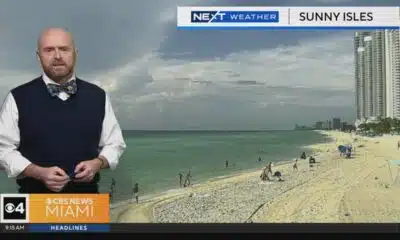News from the South - Louisiana News Feed
Louisiana ponders IVF protections that anti-abortion groups oppose
by Greg LaRose, Louisiana Illuminator
April 27, 2025
A Louisiana lawmaker says he wants to avoid the scenario that unfolded last year in Alabama, where clinics offering in vitro fertilization closed their doors rather than risk legal liability based on a new interpretation of a 19th century law.
The matter has pitted some conservative Republicans, who normally take the same side on reproductive health issues, against one another. It also provides a glimpse into the national debate over IVF, which proponents fear could be threatened under Trump administration policy.
Sen. Thomas Pressly, R-Shreveport, received committee approval Tuesday for Senate Bill 156, which he said “is essential for IVF to continue in Louisiana.” But the proposal’s language had to be massaged to get the backing of one staunch anti-abortion lawmaker. Even then, the measure is still opposed by the state’s top two anti-abortion groups.
Senate Health and Welfare Committee member Rick Edmonds, R-Baton Rouge, stood firm on making a change to the definition of embryo in Pressly’s proposal. As a state representative, he authored a 2016 law to prohibit abortions for genetic abnormalities.
Originally, Pressly’s bill referred to an “in vitro fertilized human embryo” as one that “has certain rights granted by law … and organized that it may develop in utero into an unborn child.” Edmonds amended the proposal to define an embryo as “biologically human,” removing any reference to whether it actually develops into a child.
GET THE MORNING HEADLINES.
These seemingly subtle differences in language could become critical if its final version creates a situation similar to what happened last year in Alabama. Its state Supreme Court ruled in February that frozen embryos outside the womb are considered children under the law, citing an 1872 statute that allows lawsuits for the wrongful death of a child. Fearing potential legal consequences from embryos that become nonviable – even through no fault of their own – IVF clinics in Alabama shut down.
The Alabama Legislature then scrambled to approve civil and criminal protections for IVF providers, leading clinics to reopen. There remain concerns, however, over whether long-term access will remain available.
The Trump administration’s cuts to federal health care programs have served to reinforce such worries about the future of IVF. Staff reductions at the U.S. Centers for Disease Control and Prevention (CDC) will curtail research into IVF and other fertility treatments, experts say.
The changes have unfolded rapidly, even though Trump referred to himself as the “fertilization president” after signing an executive order last month to expand fertility treatment access. A separate order from Trump in February sought policy direction on IVF, yet Elon Musk’s Department of Government Efficiency went ahead with the CDC attrition plans.
Anti-abortion groups back status quo
Louisiana Right to Life and Louisiana Family Forum oppose Pressly’s bill. Both groups were at the forefront of creating one of the nation’s strictest abortion bans three years ago after the U.S. Supreme Court struck down Roe v. Wade. The landmark 1973 opinion declared women have a constitutional right to an abortion, but it also said states could regulate when the procedure is allowed. With the Dobbs v. Jackson Women’s Health Organization decision in June 2022, justices removed the federal right to an abortion and opened doors to outright state bans.
During Tuesday’s committee hearing, Pressly insisted his proposal was essential to ensure IVF remains available to 1 in 6 families that struggle with infertility, citing numbers the World Health Organization has used. It has been nearly 40 years since Louisiana has updated its IVF statute, and health technology improvements in the interim need to be reflected in the law, the senator said.
Kathleen Benfield, legislative director with Louisiana Family Forum, told the committee the Pressly proposal is unnecessary because the state’s IVF law has never been challenged.
“Not one example has been given where the practice of in vitro fertilization or any other artificial reproduction technology has been threatened (in Louisiana), and I don’t think it will be threatened,” Benfield said.
Even with Edmonds’ amendment, the bill’s language was still problematic for Benfield. She took issue with describing a “viable in vitro fertilized embryo” as a “juridical person,” or an entity that has the same rights in law as a person but is not a human being.
Put another way, Pressly’s bill doesn’t go nearly far enough to treat embryos as children, according to Benfield. A juridical person is “not the same thing as a natural person,” she said.
Last year, anti-abortion forces pushed to change to an IVF protection bill Rep. Paula Davis, R-Baton Rouge, sponsored. She shelved her bill when rather than include the term “biological human beings” in it, fearing it could lead to criminal consequences for reproductive care providers.
Davis has authored another version of her bill this year, but it has yet to be scheduled for a House committee hearing in the lawmaking session that ends June 12.
Erica Inzina, policy director for Louisiana Right to Life, said the state’s current IVF law has room for improvement, but it still offers the most protection for human embryos of any state. Pressly’s bill would weaken those safeguards, she said.
“It leaves the embryo looking a lot more like a thing rather than a person,” Inzina told the committee.
‘We’re quibbling’
The proposed changes are the product of a rather unusual partnership: Pressly, who gained approval for a first-of-its-kind abortion drug restriction; and Katie Bliss, an attorney whose firm specializes in in vitro fertilization contracts.
Pressly, who joined the Senate last year after four years as a state representative, authored a law in 2024 that treats mifepristone and misoprostol as Schedule IV controlled dangerous substances. Both medications are used in abortions but have other applications, including lifesaving ones. The Schedule IV status puts them on par with drugs that have addiction and abuse potential, meaning hospitals have to keep them under lock and key.
Some health care providers have said the added layers of security for controlled dangerous substances put women’s lives at risk when, for example, misoprostol is needed immediately to stop postpartum hemorrhaging.
Bliss has two children conceived through IVF. She said the revisions to existing law are needed to protect patients and physicians while also ensuring care for embryos.
Louisiana is the only state that’s made the destruction of embryos illegal, and conservative lawmakers have tried unsuccessfully in the past to stop patients from shipping embryos out of state for disposal. Such measures are unconstitutional, Bliss said, because one state can’t tell another state how to conduct business.
Sen. Alan Seabaugh, R-Shreveport, attempted last year to end embryo transports across state lines, but the amendment he tried to attach to another lawmaker’s bill was ruled irrelevant to the original proposal and therefore was not allowed.
Pressly said his bill covers this scenario because it would make any IVF contract null and void if it includes a provision for the intentional destruction of an embryo.
Edmonds also objected to the removal of the terms “married couple” and “parental” from a section of existing IVF law that deals with embryo donations. Instead, “person” is used to describe an embryo donor and recipient.
Pressly told Edmonds keeping “couple” in the law could create constitutional issues, implying it conveys bias against single people who want to start a family through IVF.
“It would be hypocritical for me to vote for a bill that would eliminate parental rights,” Edmonds said, though Pressly assured him his proposal doesn’t pose that threat.
Sen. Beth Mizell, R-Franklinton, shared with other committee members that she personally had a “horrible history of miscarriages” and feared her children would have the same difficulty. Through IVF, her son and daughter-in-law have given her three of her eight grandchildren.
Mizell said she had “a hard time finding obstacles” in a bill that gives more people the opportunity to start and grow families.
“I’m listening to pro-life people argue with pro-life people,” Mizell said, who then recounted efforts during her nine years in the Senate to put strict abortion laws in place. As a result, she said Louisiana has the strongest anti-abortion laws in the nation.
“… We’re there and we’re quibbling” over language to protect IVF, she said.
YOU MAKE OUR WORK POSSIBLE.
Louisiana Illuminator is part of States Newsroom, a nonprofit news network supported by grants and a coalition of donors as a 501c(3) public charity. Louisiana Illuminator maintains editorial independence. Contact Editor Greg LaRose for questions: info@lailluminator.com.
The post Louisiana ponders IVF protections that anti-abortion groups oppose appeared first on lailluminator.com
Note: The following A.I. based commentary is not part of the original article, reproduced above, but is offered in the hopes that it will promote greater media literacy and critical thinking, by making any potential bias more visible to the reader –Staff Editor.
Political Bias Rating: Center-Right
The content predominantly discusses legislative efforts in Louisiana related to in vitro fertilization (IVF) and the complex intersection of reproductive health and anti-abortion policies. The article highlights the tension between conservative lawmakers, such as Senator Thomas Pressly, and anti-abortion groups over the language used in IVF legislation. While the piece references concerns about the potential impact of federal policies under the Trump administration, including cuts to healthcare programs, it largely focuses on the state-level political dynamics and the challenges faced by reproductive healthcare providers.
The framing reflects a more conservative stance on abortion, referencing prominent anti-abortion groups and their opposition to some aspects of the proposed bill. This, combined with a detailed explanation of conservative lawmakers’ actions, positions the article as leaning Center-Right, with a specific emphasis on the protection of embryos and opposition to policies that might weaken these protections. The inclusion of Trump administration policies also highlights a broader conservative political context.
News from the South - Louisiana News Feed
Danger of fireworks & How to avoid injury
SUMMARY: Doctors warn of the dangers fireworks pose to the eyes, with 15% of fireworks injuries affecting vision. Lisa Dickerson lost sight in one eye after a bottle rocket malfunctioned during a family celebration. Despite multiple surgeries, she now has significant scarring and disfigurement. Dr. Aaron Shriver and others note a spike in firework-related eye injuries following legalization in Iowa, overwhelming emergency rooms. Safety tips include keeping a bucket of water and fire extinguisher nearby, waiting 20 minutes before handling duds, soaking faulty fireworks in water, and wearing protective goggles. Lisa urges caution to prevent similar life-changing injuries.
If you plan on setting off fireworks, doctors are warning you to protect your eyes.
News from the South - Louisiana News Feed
Midday Ark-La-Miss Update for Friday, July 4, 2025
SUMMARY: West Monroe police arrested Stanley Vandivere after a bank robbery where he wore a clown mask, threatened a customer and employees with a gun, and stole \$1,000. He was charged with second-degree kidnapping, armed robbery, and resisting arrest. Meanwhile, Meghan O’Boyle, 41, was arrested for defrauding an elderly woman of over \$600,000, charged with exploitation and theft. Starting August 1, Louisiana will ban handheld phone use while driving statewide, enforceable as a secondary offense. Twin Cities will celebrate Independence Day on July 5 with fireworks, runs, parties, and a patriotic flag display downtown. Spotty storms possible; highs near mid-90s.
Midday Ark-La-Miss Update for Friday, July 4, 2025
News from the South - Louisiana News Feed
Potential tropical storm could possibly form today on the East Coast
SUMMARY: A potential tropical storm could develop today along the East Coast, with a 70% chance of formation, possibly becoming a named storm by tomorrow. Current weather shows hot temperatures in the upper 80s to low 90s, feeling like upper 90s to triple digits in some areas. Light, hit-or-miss showers are passing through, with occasional thunderstorms expected later this afternoon into the evening, especially near coastal and river parishes. By fireworks time, skies should clear up. Travelers along the coast and towards the Carolinas should prepare for rain through the weekend into Monday. Rain chances will increase late weekend, but no major washout expected today.
The NHC has an area of interest off the east coast of the United States highlighted for potential development this weekend.
Subscribe to WDSU on YouTube now for more: http://bit.ly/1n00vnY
Get more New Orleans news: http://www.wdsu.com
Like us: http://www.facebook.com/wdsutv
Follow us: http://twitter.com/wdsu
Instagram: https://www.instagram.com/wdsu6/
-
The Center Square6 days ago
U.S. Senate prepares for passage of One Big Beautiful Bill Act | National
-
News from the South - Louisiana News Feed7 days ago
Water company hiked sewage rates in Lafayette to state’s highest
-
Mississippi Today5 days ago
Feds unfreeze $137 million in Mississippi education money
-
News from the South - Tennessee News Feed7 days ago
“Choose how you love:” Nashville Pride 2025
-
News from the South - Arkansas News Feed7 days ago
Congress unlikely to enact ‘absolutely devastating’ Trump proposal to slash Pell Grants
-
News from the South - Arkansas News Feed6 days ago
Thousands celebrate pride, progress at the 2025 NWA Pride Parade
-
Local News6 days ago
Mississippi airports working to complete projects
-
News from the South - Arkansas News Feed6 days ago
Beyoncé handles car tilting in air during Houston show










































